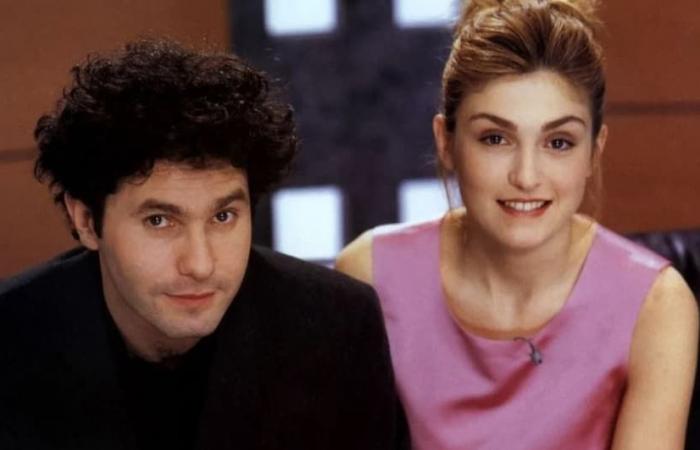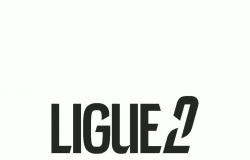
Behind the scenes of French comedies (4/5) – This winter, BFMTV reveals the secrets of extraordinary, cult or unusual comedy films. Today, Delphine 1, Yvan 0.
754,420 admissions in 1996. And almost 30 years later, 70 broadcasts on French television, including 58 in the last ten years. The romantic comedy Delphine 1, Yvan 0 has become since its release the most broadcast film on French television, ahead of successful cartoons like Kirikou and the wild beasts (2004), The Twelve Labors of Asterix (1975) or even Asterix and Cleopatra (1968).
An unexpected destiny for this romantic comedy written and directed by Dominique Farrugia whose innovative script testifies to the inventiveness of French comedies of the 1990s. While Delphine (Julie Gayet) and Yvan (Serge Hazanavicius) fall in love and decide to live together, each stage of their lives is commented on by sports journalists Thierry Roland and Jean-Michel Larqué like a football match.
Nearly 30 years after its release, Dominique Farrugia remains very proud of this film, his first after the end of his collaboration with his accomplices from Les Nuls Chantal Lauby and Alain Chabat. “A love story with commentary, it was before reality TV, without doing it on purpose,” says the director. An idea that he had within him for years before starting the project in 1994-1995.
“I went to see (producer) Richard Pezet who ran AMLF. I told him the idea. He said 'why not'. I said I wanted to write it with Michel Hazanavicius in Los Angeles. ” The producer trusts them completely: “We didn't have a contract with him, which is crazy, totally crazy. He advanced the money and we left for the United States. Good luck.”
“A bit complicated”
A shadowy man of French cinema who died in 2019, Richard Pezet worked on The City of Fear. He has always worked for popular comedy, by Michaël Youn (At Beuze) to Dany Boon (Welcome to the Ch'tis).
“When I see today the difficulty I have in putting together series, 30 years ago, a gentleman behind his desk could just say 'ok, Dominique, we're doing it, you go'. It was mad.”
Dominique Farrugia and Michel Hazanavicius wrote the screenplay in three months. “We had set ourselves a schedule of 10 a.m. to 6 p.m. every day except weekends and public holidays. French public holidays, of course,” specifies the director. “I remember that it was enjoyable to do. And then there's nothing better than writing a film and saying to yourself, come on, it's 6 p.m., we're going for a swim.”
With its mockumentary-style scenes, Delphine 1, Yvan 0 is part of the lineage of American comedies like Spinal Tap et When Harry Met Sally which blur the line between fiction and documentary. “The 'facing camera' (scenes) of When Harry Met Sallyit's so strong,” exclaims Farrugia. “You never know if they are actors or people telling their real story. It's magical.”
The original pitch of the film easily appealed to Thierry Roland and Jean-Michel Larqué. “I called the TF1 editorial team. I got the sports department and I spoke to Thierry Roland directly. That’s it,” remembers Dominique Farrugia. On the set, the two legends of the small screen sometimes had difficulty complying with the exercise. “They had a teleprompter. It was a bit complicated. There were a lot of texts.”
Risks
Filmed in sequence shots, Delphine 1, Yvan 0 is inspired by Husbands and Wives (1992), a Woody Allen film shot with a hand-held camera. “I think that if someone told me today to make a comedy in long shots, I would say that it wouldn't work. But I managed to do it. I don't know how,” concedes the director. “I took a lot more risks on my first film than I took on Bis For example.”
“What I am happy with is the dialogue between Serge and the camera which follows him all the time,” continues the director. “I had a production director who didn't understand that these were sequence shots and who found that we did too few shots per day! One day, I brought him to the editing room and told him, ' There you go, we did 3'30 today. It's a plan.”
For Dominique Farrugia, Delphine 1, Yvan 0 is “totally UFO”. He shot the film “very quickly”, in less than five weeks, with “not a lot of money”. “I think the dialogues in this film are quite successful. I don't know if my direction is completely successful.” Another risk-taking: the director insists that there is nothing exceptional in this love story between Delphine and Yvan.
“That’s what was fun,” he says. “(I had been marked) by the formula of a French author of the time. He said that living with a woman and making her happy was the last great human adventure. Which I found very pretty literally. .”
Autobiographical film
The director also draws inspiration from his private life at the time. “It’s quite strange,” he admits in hindsight. “It's a real thirty-year-old film with everything a thirty-year-old has in his head. I think it's the most autobiographical film I've been able to make in my career with Bis.” In the casting, he also surrounded himself with all his friends, from Serge Hazanavicius to Lionel Abelanski via Alain Chabat and Chantal Lauby.
The filming takes place in a joyful atmosphere. We also find a bit of the spirit of Dummies in the film – notably the “in your ass” joke. Based on the comedy of repetition, it consists of answering any question starting with “where” with “in your ass”. “I made this film while having fun and with almost no obligation to achieve results.”
When it was released on June 19, 1996, the audience was there for it without making it a popular success. With only 754,420 entries, the score is “not great”, laments Dominique Farrugia. “At the time, it should have done a lot more.” “Maybe I haven’t worked hard enough,” he adds before clarifying: “I still live a lot with imposter syndrome.”
Critics of Delphine 1, Yvan 0 are very bad. During a screening of her film, Dominique Farrugia is seated behind two women. “There's a scene where the mother and daughter pour each other tea and talk. The two ladies started talking to each other. 'I would like some tea, do you drink it?' 'Yes, yes, I like the tea thing.' 'Me, rather another one, a little smoked. We're bored, aren't we?' And they're gone.”
Looped at night
Dominique Farrrugia then goes to a film market in London to export his film internationally. Here too the reactions are unanimously negative. “In the room where the film was showing, everyone left except one guy who had fallen asleep. Then he woke up (and) he left. It was not a film made for export.”
Over time, the film had an unexpected fate. “It’s with time that my films improve,” assures Dominique Farrugia. “I'm often told: 'In the end, it wasn't bad.' For around ten years, it has enjoyed a second life thanks to the TF1 group's channels, which broadcast it on a loop – mainly at night. Dominique Farrugia thinks he knows the reason for this multicast.
“I sold my shares in my company to my former partner who sold all the films that were in his company and in our company to TF1. So this film belongs 100% to TF1. It is one of the films that they can watch again at night without any problem, without it costing them 1 euro”, explains the director. “I’m quite happy because this film which had fallen into oblivion a bit is coming back.”




